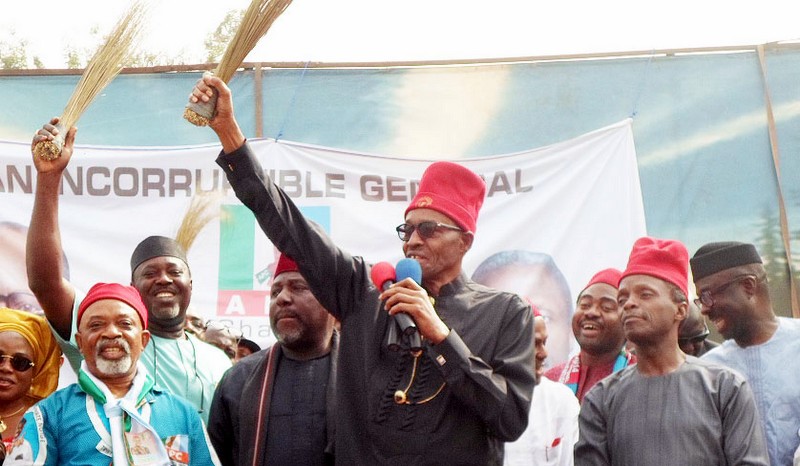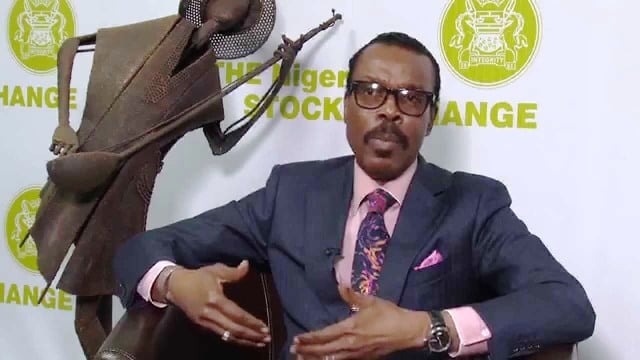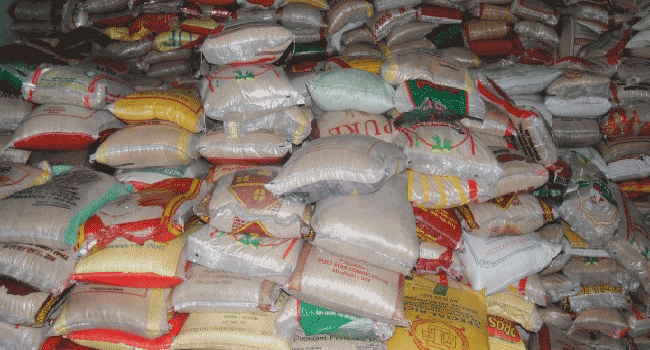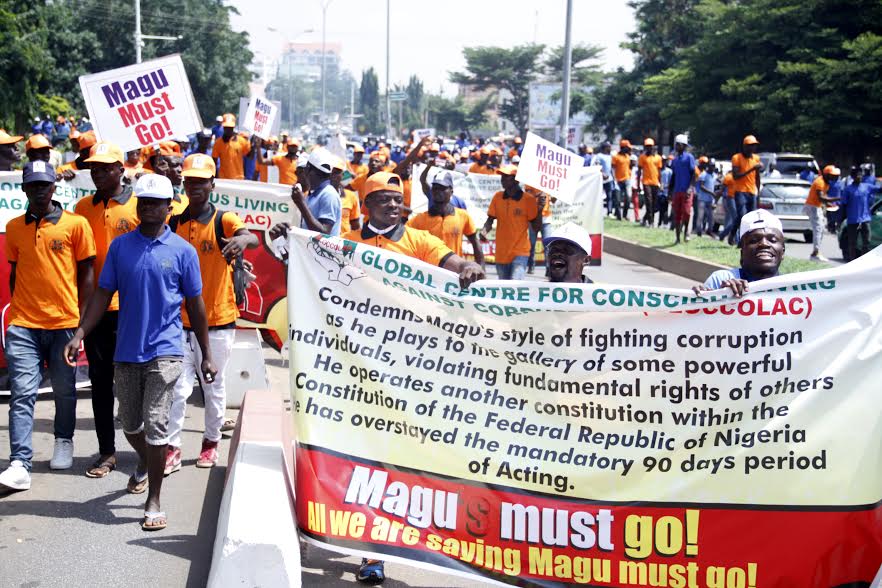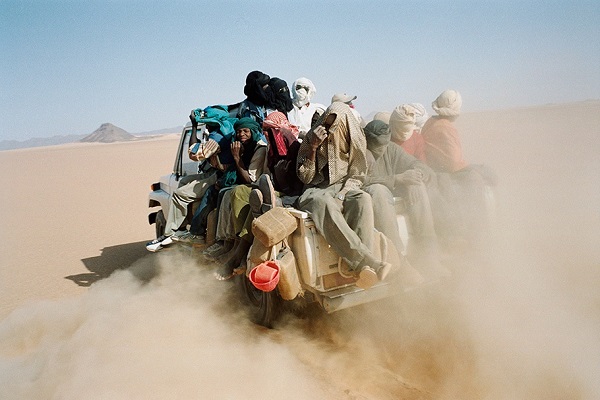Just how much has the Muhammadu Buhari-led administration delivered in two years?
David Ajikobi and Stanley Oronsaye with Africa Check, a non-partisan fact-checking organisation, have appraised nine key pledges made by the All Progressives Congress (APC) and the presented verdicts based on facts and figures.
The report is reproduced below:
Nigeria’s 2017 Democracy Day — celebrated every year on 29 May — marked the 2nd anniversary of President Muhammadu Buhari’s All Progressive Congress government.
In the run-up to the election, Buhari promised Nigerians change through many policies, programmes and interventions, as contained in his Covenant with Nigerians document as well as the APC’s election manifesto.
Advertisement
Have these promises been taking shape or have they been relegated to mere electioneering? We appraise 9 promises made about sectors that affect all Nigerians, revisiting some we checked on a year ago.
Social welfare
Promise: “Introduce free daily school meals for all primary school children.”
Verdict: In progress
Advertisement
The National Home Grown School Feeding Programme is a critical part of a N500 billion social investment programme Buhari’s administration promised.
Feeding 15 million primary school pupils (from classes 1 to 6) daily is expected to boost food production and create jobs. A pilot phase started a few months ago in 7 states: Anambra, Ogun, Oyo, Osun, Ebonyi, Zamfara, and Enugu.
Currently over a million primary school pupils receive meals daily, an assistant to the acting president, Laolu Akande, announced, but the pilot is yet to become a nationwide programme.
Promise: “Create a phased social insurance scheme to assist certain groups in the population with social welfare payments.”
Advertisement
Verdict: Achieved
The Buhari-led government has kept its word in creating a phased social insurance scheme with cash payouts to the poorest and most vulnerable Nigerians.
As part of a pilot that started in January, people in 9 states who are registered as poor or vulnerable — reportedly based on a World Bank model — receive N5,000 monthly. The 9 states are: Bauchi, Borno, Cross Rivers, Ekiti, Kwara, Kogi, Niger, Osun and Oyo, according to Laolu Akande, a special assistant to the acting president.
Information minister Lai Mohammed said on Democracy Day about 26,000 people have benefitted so far from these monthly payouts.
Advertisement
Health
Promise: “Ensure that no Nigerian will have a reason to go outside of the country for medical treatment.”
Verdict: Not achieved
Advertisement
Buhari himself hasn’t even kept the promise. In the past year alone, he went abroad 3 times to seek medical treatment.
In June 2016, Buhari went to London to consult an ear, nose and throat specialist about an ear infection. Earlier this year, he spent 51 days in the British capital on extended medical leave and returned on 7 May on indefinite medical leave. The details of his condition are closely guarded by his confidants.
Advertisement
In May this year, Nigeria’s minister of state for health, Dr Osagie Ehanire, admitted that the country’s health sector is still grappling with many issues and he claimed that Africa’s most populous country loses over US$1 billion every year to medical tourism.
In September 2016, the government abandoned a plan to build 10,000 primary health care centres. Instead, it launched a drive to revamp existing ones, which includes renovation, re-equipping and the signing up of 200,000 voluntary health workers to improve antenatal care, immunisation and other health services.
Advertisement
To fix 10,000 primary health centres, the government would need about US$700 million, the executive director of the National Primary Healthcare Development Agency, Faisal Shuaib, calculated.
Employment
Promise: “Target the creation of 3 million new jobs a year through industrialisation, public work and agricultural expansion.”
Verdict: Not achieved
Nigeria is in the midst of a recession, with the economy contracting for the 5th quarter in a row.
Though 1,396,836 jobs were created between the 3rd quarter 2015 (the first full quarter Buhari’s government were in power) and the 3rd quarter of 2016 (the last for which data is available), this was not enough to keep up with the increase in the labour force.
Nigeria’s unemployment rate rose from 8.2% in the period Buhari was sworn in to 13.9% in the 3rd quarter of 2016, data from the country’s National Bureau of Statistics shows. This is the highest unemployment rate recorded since 2009.
(Note: Unemployment refers to people between 15 and 64 who were available for work and actively looked for work during the reference period but were without a job.)
National security
Promise: “Ensure that under my watch, no force, external or internal, will occupy even an inch of Nigerian soil.”
Verdict: Mixed progress
Northeastern Nigeria has been the eye of the Boko Haram insurgency. By December 2016, the International Organisation for Migration reported that 1,770,444 people had been internally displaced in 106 of the 112 local governments in the region.
Since Buhari’s inauguration, continued military action in the region and cooperation with neighbouring countries has resulted in reclaiming swathes of land previously under the group’s control. On 22 December 2016, Nigerian troops captured the symbolic Sambisa forest — which was believed to be the operational base of Boko Haram.
Judging whether this promise has been fulfilled depends on how you define “occupy”, Ryan Cummings, director of risk management consultancy Signal Risk and founding member of the Nigerian Security Network, told Africa Check.
Senior researcher at SBM Intelligence, Cheta Nwanze, explained that Boko Haram “have been dislodged from most places that they occupied but they still have little outposts here and there especially in the far north of Borno State”.
But the period in which Boko Haram “exerted control over population centres, displaced federal governance structures and effectively administered communities under Sharia law” has seemingly ended, Cummings added.
Boko Haram still makes its presence felt with suicide bombings, though. In addition, in other parts of the country attacks and killings associated with Fulani herdsmen have increased, with attackers sometimes laying siege to series of communities.
Corruption
Promise: “Work with National Assembly towards the immediate enactment of a Whistle Blower Act.”
Verdict: In progress
At the end of last year, Nigeria’s finance minister announced the commencement of the whistleblowing policy.
“It is a programme designed to encourage anyone with information about a violation, misconduct or improper activity that impacts negatively on the Nigerian people and government to report it,” Kemi Adeosun told journalists.
For corruption-related information, the whistleblower gets between 2.5% and 5.0% of the total amount recovered. By April 2017, the policy has reportedly led to the recovery of N73 billion from various people.
The biggest seizure was the more than US$43 million recovered in an upscale Lagos apartment. More than US$9 million was also recovered from the personal safe of a former director of the state’s oil company NNPC, Andrew Yakubu.
However, this policy is yet to be enacted by parliament as Buhari promised. The leader of Nigeria’s senate, Bukola Saraki, said it would happen in July.
Housing
Promise: “Create a mortgage market by reforming land ownership to give ordinary Nigerians easy access to title deeds.”
Verdict: No progress
The Land Use Act of 1978 makes the Nigerian government (whether federal, state or local) the primary owners of all land. People buying land receive a certificate of occupancy which expires after 99 years. The certificate can be revoked at any time, but only under certain conditions.
Commercial banks are therefore hesitant to issue mortgages and most Nigerian households finance their homes independently, with savings or non-mortgage credit, the Centre for Affordable Housing Finance in Africa said in its 2016 yearbook.
The ruling party had promised to amend the constitution and Land Use Act to create freehold interests in land. Two years on, it is yet to be amended, though federal lawmakers announced in 2016 that it was in the works.
However, the minister in charge of housing shot down the plan, arguing that land administration is the exclusive preserve of states.
Cost of governance
Promise: “Work with the leadership of National Assembly to cut down the cost of governance.”
Verdict: Mixed progress
To prune government overheads, Buhari merged some ministries in April 2016, while prohibiting government-sponsored trips abroad for public officials seeking medical treatment.
He also reduced the presidential aeroplane fleet — releasing 2 planes to the Nigerian Air Force and ordering the sale of 2 others. A presidential committee in the previous government recommended scrapping 102 statutory agencies, but it is yet to happen.
Budget figures from 2015, 2016 and 2017 show the cost of running the government is decreasing as a share of the total budget. (Note: The 2017 budget is yet to be signed by the president.)
Source: Budget Office of the Federation
Electricity
Promise: “The APC government shall vigorously pursue the expansion of electricity generation and distribution of up to 40,000 MW in 4 to 8 years.”
Verdict: Slow progress
Though the minister of power, housing and works, Babatunde Fashola, claimed in January that the Nigerian government achieved “an all-time high of 5,074 MW in power generation”, this is not recorded on the Nigerian Electricity Regulatory Commission’s website.
Entries on the website, which only date back to November 2015, show the highest electricity generation took place on 7 February 2016, with 4,741 MW recorded. The latest entry shows the country had a total daily generated power of 4,433 MW on 29 May 2017.
In March, the executive council approved N701 billion as a power assurance guarantee. The sum is expected to help pay for the transmission and distribution of electricity produced by generation companies so they can, in turn, pay off debts owed to gas suppliers.
The government is also looking to complete transmission projects that stalled under the Jonathan administration. The completion of the Zungeru power plant is expected to add 700 MW to the grid.
There is also traction in the government’s bid to increase electricity generation from other energy sources than hydroelectricity and gas turbines. A 10 MW wind power project has been revived in Katsina state while the government has signed agreements for 1,200 MW of solar power. Electricity from nuclear energy is also reportedly being considered.
Add a comment
